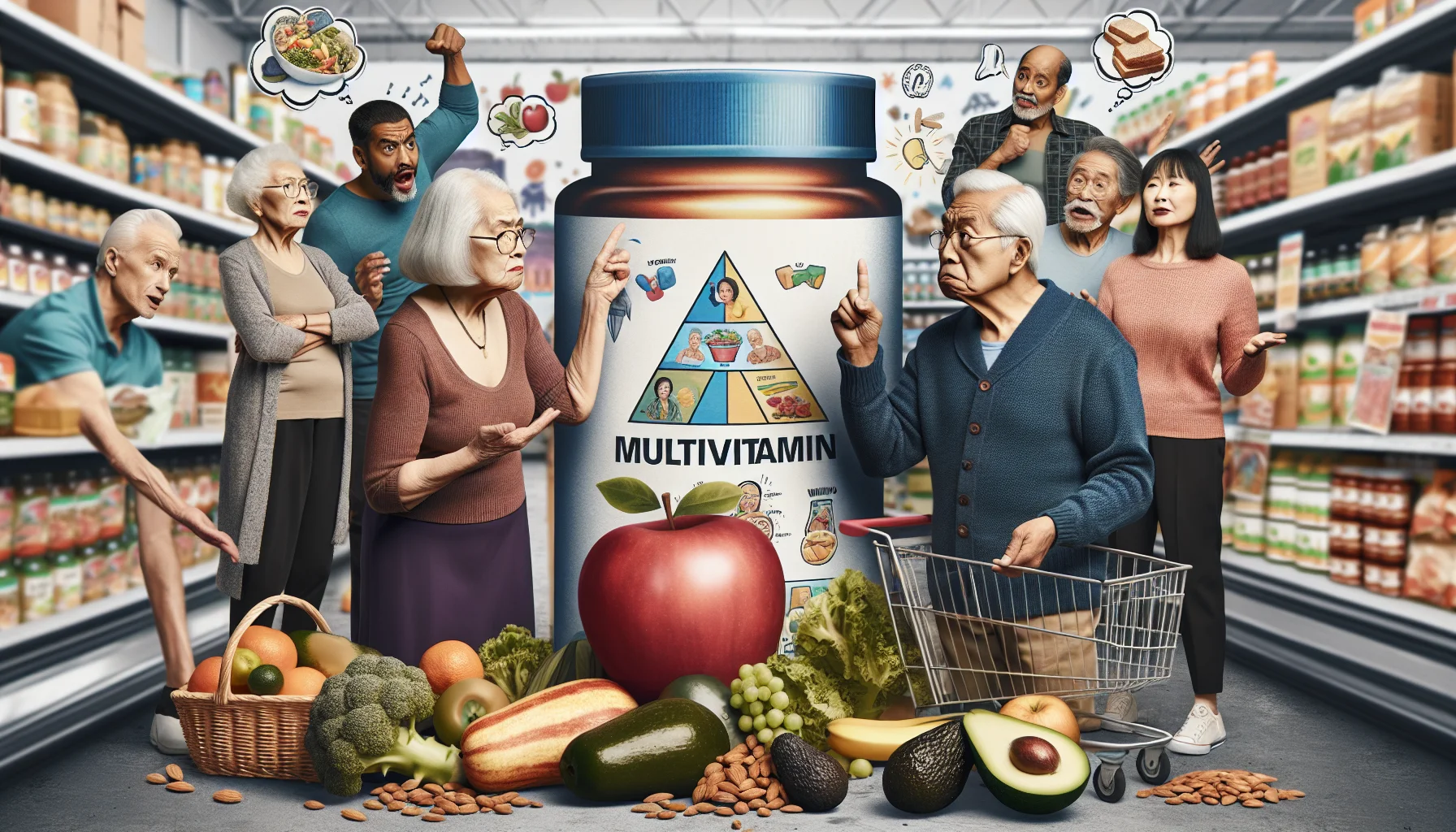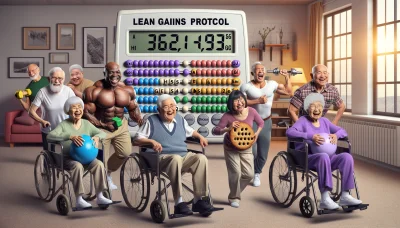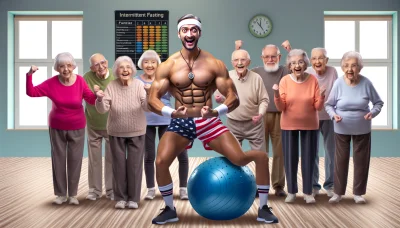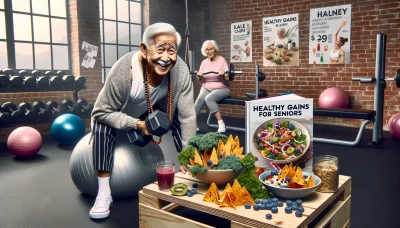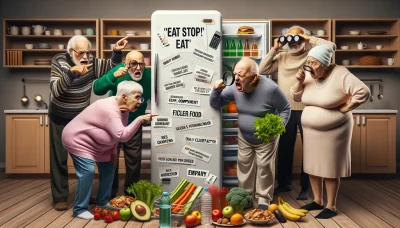Best multivitamin for seniors over 70 Quiz
Test Your Knowledge
Question of
Understanding Nutritional Needs for Seniors Over 70
Key Vitamins and Minerals for Aging Bodies
As we age, our bodies undergo significant changes that affect how we process nutrients. For seniors over 70, it's crucial to focus on a diet rich in specific vitamins and minerals to maintain health and vitality. This isn't just about eating healthy; it's about strategically consuming foods that cater to the unique needs of an aging body.
Ensuring a balanced intake of essential nutrients can help mitigate the risk of chronic diseases, enhance mental clarity, and improve overall quality of life. It's not merely a suggestion; it's a necessity for embracing the golden years with vigor and joy!
Importance of Vitamin D and Calcium for Bone Health
Vitamin D and Calcium are the dynamic duo when it comes to maintaining bone health in seniors. As bones become more fragile with age, incorporating these nutrients into your diet becomes non-negotiable. They work together to keep bones strong, reducing the risk of fractures and osteoporosis.
Sunlight is a great source of Vitamin D, but let's be honest, not everyone can soak up enough sun regularly. That's where supplements and Vitamin D-rich foods come into play. Combine them with Calcium-packed options like dairy products or leafy greens, and you're setting up a fortress against bone-related setbacks.
Role of B Vitamins and Iron in Energy and Cognitive Function
B Vitamins and Iron are your best allies in fighting fatigue and keeping your mind sharp. These nutrients play critical roles in energy production and cognitive function, making them indispensable for seniors who aim to stay active and mentally agile.
With age, absorbing these nutrients becomes more challenging, emphasizing the need for a well-rounded diet or supplements. Enriching your meals with whole grains, lean meats, and green vegetables ensures you're fueling your body with what it needs to thrive.
Adjusting Dietary Intake with Age
The golden years bring many changes, including how our bodies process food. Understanding these changes is key to adjusting dietary intake appropriately. Its not just about what you eat; its also about adapting how much and how often you eat based on your bodys evolving needs.
This adjustment is crucial for maintaining optimal health, preventing weight gain or loss issues, and ensuring that every calorie counts towards meeting your nutritional requirements.
How Metabolism Changes After 70
After hitting 70, metabolism takes a slow dive. This means fewer calories are needed daily compared to younger years. But here's the kicker: while you may need fewer calories, your nutrient needs remain sky-high.
Acknowledging this shift is vital in preventing weight gain while ensuring you're not missing out on essential nutrients. It calls for a delicate balance that prioritizes nutrient-dense foods over empty caloriesa challenge worth accepting for the sake of longevity and well-being.
Adapting Portion Sizes and Meal Frequency
Adapting portion sizes and meal frequency is not just recommended; it's necessary! With a slower metabolism in play, large meals can lead to unwanted weight gain. Instead, focus on smaller, nutrient-rich meals spread throughout the day to keep energy levels steady without overloading your digestive system.
- Eat smaller portions more frequently: Aim for 4-6 small meals throughout the day instead of three large ones.
- Increase hydration: Drink plenty of water between meals to aid digestion and maintain hydration levels.
- Prioritize nutrient-dense foods: Choose foods packed with vitamins, minerals, and fiber over empty-calorie options.
- Mindful snacking: Opt for healthy snacks like fruits or nuts instead of sugary treats or salty snacks.
- Consult with professionals: Always seek advice from healthcare providers or dietitians when making significant dietary changes.
Evaluating Multivitamins for Seniors
Deciphering Labels and Ingredients
Understanding what's in your multivitamin is crucial, especially for seniors. Labels can be a maze of confusing terms and percentages, but focus on key nutrients that support aging bodies. Look for vitamins D, B12, and calcium, which are often needed more as we age. Avoid products with excessive fillers or artificial additives; simplicity in ingredients often signifies quality.
Distinguishing between synthetic and natural sources of vitamins can also impact your choice. Natural sources may be easier for the body to absorb, though they can also be more expensive. Pay attention to the "serving size" to ensure you're comparing apples to apples when evaluating the potency and cost-effectiveness of different brands.
Identifying High-Quality Multivitamin Brands
High-quality multivitamins are transparent about their sourcing and manufacturing processes. Look for brands that undergo third-party testing by organizations like USP (United States Pharmacopeia) or NSF International. These certifications indicate that the product meets strict standards for purity and potency.
Reputation matters. Research consumer reviews and expert opinions on brands. A long-standing positive track record is a good indicator of a brand's reliability and efficacy. Don't be swayed by marketing gimmicks; focus on factual information and verified reviews.
Understanding Dosages and Recommended Daily Allowances
Dosages are not one-size-fits-all, especially for seniors who may have specific nutritional needs. It's essential to understand the Recommended Daily Allowances (RDAs) for your age group and condition. Exceeding RDAs can sometimes do more harm than good, leading to toxicity or interference with medications.
Consulting with a healthcare provider is key in determining the right dosage for you, considering any existing conditions or medications. Personalization in vitamin intake ensures you're supporting your health without risking negative interactions or side effects.
Tailoring Multivitamins to Individual Health Concerns
Seniors face unique health challenges that can be supported through targeted nutrition. Heart health is a major concern, with nutrients like omega-3 fatty acids, magnesium, and Coenzyme Q10 playing supportive roles in maintaining cardiovascular wellness.
Vision deterioration is another common issue among seniors. Vitamins A, C, E, and minerals like zinc can contribute to eye health maintenance. Lutein and zeaxanthin are specifically beneficial for macular health, crucial for preventing age-related macular degeneration.
Supplements for Heart Health and Cholesterol Management
- Omega-3 Fatty Acids: Essential for heart health, reducing triglycerides and supporting overall cardiovascular wellness.
- Magnesium: Helps regulate blood pressure levels and supports heart muscle function.
- Coenzyme Q10: An antioxidant that helps maintain healthy cholesterol levels and supports heart energy production.
- Niacin (Vitamin B3): Can help reduce LDL cholesterol while increasing HDL cholesterol when taken under medical supervision.
Addressing Vision and Eye Health Through Nutrition
Nutrition plays a pivotal role in maintaining vision health as we age. Incorporating multivitamins rich in antioxidants such as vitamins A, C, E, zinc, lutein, and zeaxanthin can protect eyes from harmful light exposure and oxidative stress, which contribute to age-related vision decline.
Tailoring your multivitamin intake to include these nutrients can help preserve vision quality and delay the progression of diseases like cataracts or age-related macular degeneration. Always consult with an eye care professional or healthcare provider before starting any new supplement regimen for targeted advice based on your specific needs.
The Role of Diet in Senior Health Maintenance
When it comes to senior health, the role of diet cannot be overstated. A balanced diet plays a crucial part in maintaining overall well-being, preventing diseases, and ensuring a quality life as we age. It's about making informed choices that support bodily functions, from cognitive health to physical strength.
Understanding the specific nutritional needs of seniors is key to crafting a diet plan that supports heart health, bone density, digestive functions, and much more. This journey towards a healthier lifestyle requires attention to what we eat and how those choices impact our body's changing needs.
Balancing Macronutrients for Optimal Well-being
The Importance of Protein in Preserving Muscle Mass
For seniors, protein is a cornerstone nutrient that helps in preserving muscle mass, which naturally declines with age. Consuming adequate amounts of high-quality protein supports strength, mobility, and independence among older adults. It's not just about quantity; the quality of protein sources matters immensely.
Including a variety of protein sources like lean meats, beans, and dairy products can make all the difference. This diversity ensures not only the maintenance of muscle mass but also the intake of essential amino acids vital for bodily functions.
Carbohydrates and Fats: Selecting the Right Types for Energy
Carbohydrates are the body's main energy source, but choosing the right types is crucial for seniors. Complex carbohydrates found in whole grains, vegetables, and fruits provide sustained energy and are packed with fiber, aiding digestion and heart health.
Fats should not be feared but embraced with caution. Healthy fats like those from avocados, nuts, and olive oil contribute to brain health and aid in the absorption of vitamins. It's about finding the right balance and selecting sources that provide benefits beyond just calories.
Incorporating Antioxidant-Rich Foods into Meals
Superfoods That Boost Immunity in Seniors
Antioxidant-rich foods play an indispensable role in boosting immunity among seniors. Foods like berries, dark leafy greens, and nuts are loaded with vitamins and minerals that fight inflammation and protect against diseases.
Eating a colorful variety of fruits and vegetables ensures a wide range of antioxidants are consumed. This not only supports immune function but also contributes to healthy skin and eyesight.
Natural Sources of Vitamins and How to Include Them in Your Diet
Vitamins are vital for maintaining health and preventing chronic diseases. Natural sources like fruits, vegetables, fish, and eggs provide an array of vitamins without needing to resort to supplements.
- Citrus fruits for Vitamin C - boosts immunity and skin health.
- Leafy greens for Vitamin K - essential for bone health.
- Nuts and seeds for Vitamin E - protects cells from damage.
- Fatty fish for Omega-3 fatty acids - supports brain health.
- Dairy products or fortified alternatives for Vitamin D - crucial for calcium absorption.
Incorporating these natural vitamin sources into meals can be simple yet profoundly effective. Strategies include adding fruit to breakfast cereals, including vegetables in every meal, choosing whole grain options whenever possible, and opting for healthy fats over saturated ones. Remember: Variety is key! Mixing up your food choices ensures you get all necessary nutrients while keeping meals exciting.
Special Dietary Considerations for Seniors Over 70
Managing Dietary Restrictions and Allergies
As we age, our body's needs and tolerances change, making it crucial for seniors over 70 to pay close attention to dietary restrictions and allergies. Navigating these changes requires a proactive approach in modifying diets to ensure they are getting the necessary nutrients without compromising their health. Whether its gluten intolerance, lactose intolerance, or diabetic considerations, each requires a tailored strategy.
Gluten-Free and Lactose-Intolerant Options for Seniors : The availability of gluten-free and lactose-intolerant options has significantly increased, making it easier than ever for seniors to adjust their diets without sacrificing taste or variety. Seniors should focus on incorporating naturally gluten-free grains like quinoa and rice, as well as lactose-free dairy alternatives such as almond milk or lactose-free yogurt into their daily meals.
Navigating Diabetic Diets and Blood Sugar Control : For seniors managing diabetes, maintaining stable blood sugar levels is paramount. This involves a balanced diet rich in fiber, lean proteins, and healthy fats while minimizing processed sugars and high glycemic index foods. Regular monitoring and consultation with a healthcare provider are essential to adapt the diet as needed effectively.
Importance of Hydration and Fiber Intake
Staying hydrated and maintaining adequate fiber intake are two fundamental aspects of a senior's diet that greatly impact overall health. Hydration aids in digestion, nutrient absorption, and organ function, while fiber is crucial for digestive health and regularity. Both elements play a significant role in preventing common age-related issues such as constipation and dehydration.
Strategies to Increase Water Consumption Throughout the Day : To ensure seniors are adequately hydrated, simple strategies can be employed. These include setting regular reminders to drink water, keeping a water bottle within easy reach at all times, and incorporating high-water-content foods into meals like soups, fruits, and vegetables.
- Start your day with a glass of water - Make it a habit to drink a glass of water every morning upon waking up.
- Eat more fruits and vegetables - Incorporate fruits and veggies with high water content into your diet.
- Use reminders - Set alarms or use apps designed to remind you to drink water throughout the day.
- Flavor your water - Add slices of lemon, lime, cucumber, or berries to make water more appealing.
- Prioritize hydration before meals - Drinking water before meals can also aid digestion.
Fiber-Rich Foods That Aid Digestion and Regularity : To boost fiber intake, seniors should focus on incorporating whole grains, legumes, fruits, and vegetables into their diets. These foods not only support digestive health but also contribute to heart health by helping maintain cholesterol levels. A balanced diet rich in fiber can significantly enhance the quality of life for seniors over 70.
Overcoming Common Eating Challenges in Later Years
Solutions for Decreased Appetite and Taste Alterations
As we age, our appetite and sense of taste can diminish, making mealtime less enjoyable and leading to decreased nutritional intake. It's crucial to tackle these challenges head-on to maintain a healthy and satisfying diet. Enhancing the flavor of meals without relying on excess salt or sugar can make a significant difference. Natural herbs, spices, and citrus can add a burst of flavor, making food more appealing.
Meal planning plays a pivotal role in stimulating appetite among seniors. Regular, small meals packed with nutrient-dense foods can encourage better eating habits. Including favorite foods and offering a variety of colors and textures can also make meals more enticing. It's all about finding creative ways to make each meal an enjoyable experience.
- Enhancing Flavors Naturally Without Excess Salt or Sugar: Use herbs, spices, lemon juice, and vinegar to add zest and depth to dishes without the health risks associated with too much salt or sugar.
- Meal Planning Tips for Appetite Stimulation: Plan for smaller, frequent meals throughout the day. Incorporate high-nutrient foods that are also visually appealing and easy to eat.
Addressing Swallowing Difficulties and Dental Issues
Swallowing difficulties (dysphagia) and dental issues are common problems that can make eating challenging for older adults. These conditions not only affect the ability to consume certain foods but can also pose risks of malnutrition and dehydration. Adopting a soft food diet that is still rich in essential nutrients is key. Foods like smoothies, well-cooked vegetables, and tender meats can provide necessary nutrition while being easier to consume.
Modifying the texture of foods is another effective strategy for those with swallowing difficulties or dental problems. Techniques such as pureeing or mashing can transform regular meals into more manageable forms without compromising nutritional value. This approach ensures that individuals facing these challenges can still enjoy a wide range of foods safely and comfortably.
- Soft Food Diets That Are Nutrient-Dense: Focus on incorporating smoothies, soups, mashed fruits, and vegetables, as well as finely ground meats into the diet.
- Techniques to Modify Textures for Easier Consumption: Use blenders, food processors, or hand mashers to adjust the texture of foods to meet individual needs while ensuring they remain flavorful and nutritious.
The Impact of Lifestyle on Nutrient Absorption in Seniors
Lifestyle plays a pivotal role in shaping nutrient absorption in seniors, influencing everything from metabolic health to the effectiveness of medications. As we age, our body's ability to absorb and utilize nutrients efficiently can diminish, making it crucial for seniors to adopt lifestyle habits that support optimal nutrient uptake. Engaging in regular physical activity and being mindful of medication intake can significantly impact the body's nutritional landscape.
Understanding the relationship between lifestyle factors and nutrient absorption is essential for maintaining health and wellness in senior years. Modifications in daily habits can lead to improvements in the absorption of vital vitamins and minerals, thereby enhancing overall health outcomes. It's not just about what we eat but also how our bodies process these nutrients that matter.
Physical Activity's Role in Nutritional Efficiency
Physical activity is a cornerstone of nutritional efficiency, particularly for seniors. Regular exercise not only boosts metabolism but also enhances the body's ability to absorb and utilize nutrients more effectively. By incorporating physical activities into their daily routine, seniors can significantly improve their metabolic health, leading to better nutrient absorption.
Maintaining an active lifestyle is crucial for enhancing digestive function and optimizing the absorption of vitamins and minerals from food. Exercise stimulates blood flow, supporting the efficient transport of nutrients throughout the body, which is essential for maintaining energy levels and preventing nutritional deficiencies.
Exercises That Can Boost Metabolic Health in Seniors
- Walking: A simple yet effective activity that improves cardiovascular health and metabolism.
- Swimming: Provides a low-impact full-body workout that enhances muscle strength and flexibility.
- Yoga: Improves balance, flexibility, and mental well-being while supporting digestive health.
- Resistance Training: Builds muscle mass, which is key for improving metabolic rate and nutrient utilization.
The Relationship Between Muscle Mass and Nutrient Utilization
In seniors, there's a compelling link between muscle mass and nutrient utilization. Higher muscle mass is associated with a more robust metabolism, enabling better absorption and processing of nutrients. Strength-building exercises are therefore instrumental in promoting efficient nutrient use within the body.
This relationship underscores the importance of resistance training in seniors' exercise routines. Building muscle not only supports physical strength but also optimizes the body's ability to harness nutrients from food sources effectively, contributing to better overall health.
The Influence of Medications on Nutrient Absorption
Medications can have a profound impact on nutrient absorption in seniors. Certain drugs interfere with the body's natural processes for extracting vitamins and minerals from food, potentially leading to deficiencies. Awareness of these interactions is key for mitigating their effects and ensuring balanced nutrition.
To counteract medication-induced nutrient deficiencies, it may be necessary to adjust dietary intake or consider supplementation under medical guidance. Consulting with healthcare providers about potential drug-nutrient interactions can help seniors maintain optimal nutritional status while managing their health conditions.
Common Medications That Interfere with Vitamin Absorption
- Antacids: Can reduce absorption of vitamins B12, D, and other minerals like magnesium.
- Diuretics: Often prescribed for hypertension but can lead to losses of potassium and magnesium.
- Antibiotics: Long-term use may affect gut flora balance, impacting vitamin K synthesis.
- Cholesterol-lowering drugs: May impair absorption of fat-soluble vitamins such as A, D, E, K.
How to Counteract Medication-Induced Nutrient Deficiencies
To combat medication-induced nutrient deficiencies, seniors should engage closely with healthcare professionals to monitor their nutritional status regularly. Adjusting dietary habits or incorporating specific supplements might be recommended based on individual needs.
Educating oneself about potential drug-nutrient interactions is also crucial. By understanding which medications may impact nutrient absorption negatively, seniors can take proactive steps towards maintaining a balanced diet that accounts for these interactionsensuring they receive all necessary nutrients for optimal health.
Planning a Balanced Diet for Longevity
Structuring Meals for Sustained Energy and Health
Building a Plate: Proportions of Food Groups for Seniors
To ensure vitality and health, seniors should focus on a balanced plate that emphasizes whole foods. This means filling half your plate with fruits and vegetables, a quarter with lean proteins like fish, poultry, or legumes, and the remaining quarter with whole grains. These proportions support muscle maintenance, energy levels, and overall health.
The inclusion of healthy fats from sources like avocados, nuts, and olive oil is also crucial. They play a significant role in brain health and help in the absorption of essential vitamins. Moreover, seniors should prioritize hydration by drinking plenty of water throughout the day to aid digestion and cellular functions.
Snacking Smart: Nutritious Options for Between Meals
Smart snacking is about choosing options that are both nutritious and satisfying. Seniors should aim for snacks that combine protein with fiber to keep energy levels steady. Examples include apple slices with peanut butter or yogurt with berries.
It's important to avoid processed snacks that are high in sugar or sodium. Instead, focusing on whole foods can provide essential nutrients without the added preservatives or unhealthy fats. This approach supports sustained energy and overall well-being.
- Avoid high-sugar snacks: Opt for natural sweetness from fruits instead of reaching for sugary processed foods.
- Combine protein and fiber: This pairing helps maintain stable blood sugar levels and keeps you feeling full longer.
- Stay hydrated: Sometimes thirst is mistaken for hunger. Drinking water can curb unnecessary snacking.
- Plan ahead: Having healthy snacks readily available prevents reaching for unhealthy options out of convenience.
The Importance of Meal Timing and Regularity
Aligning Eating Patterns with Circadian Rhythms
Eating patterns that align with your body's circadian rhythms can enhance metabolism and improve health outcomes. Consuming larger meals earlier in the day when metabolism is higher can lead to better energy utilization and weight management. It's beneficial to have breakfast within an hour of waking up and make lunch the biggest meal of the day.
Avoiding heavy meals late at night can also prevent sleep disturbances and promote better digestion. The body's ability to process glucose decreases at night, making it wise to limit intake of large amounts of carbohydrates or sugars in the evening.
The Benefits of Consistent Meal Schedules on Digestive Health
Maintaining consistent meal times can significantly benefit digestive health by regulating the body's internal clock. This regularity helps improve bowel movements and reduces gastrointestinal discomfort such as bloating or indigestion.
Eating at regular intervals also supports optimal nutrient absorption and helps maintain steady blood sugar levels, preventing spikes and crashes that can affect energy and mood. Establishing set times for meals encourages healthier food choices, as there is less tendency to snack impulsively on unhealthy options.
Staying Informed: Current Research on Nutrition for Seniors Over 70
Breakthroughs in Geriatric Nutrition and Supplements
The realm of geriatric nutrition has seen some fascinating breakthroughs recently. Researchers are constantly uncovering new insights that can significantly enhance the health and wellness of seniors. From revolutionary dietary supplements to groundbreaking studies on nutrient absorption, the field is advancing at an unprecedented pace. This progress promises to improve the quality of life for seniors, offering them a brighter, healthier future.
Focusing on the specific needs of seniors over 70, these breakthroughs are tailored to address common age-related challenges. By understanding and applying these innovations, seniors can prevent or manage many health issues associated with aging, leading to a more vibrant and active lifestyle.
Recent Studies on Vitamin Efficacy in Older Adults
Recent studies have shed new light on the efficacy of vitamins in older adults, particularly emphasizing the critical role of Vitamin D, B12, and omega-3 fatty acids. These nutrients have been linked to improved cognitive function, better bone health, and enhanced immune response among seniors. The findings stress the importance of maintaining optimal levels of these vitamins as we age.
Vitamin D, often referred to as the sunshine vitamin, has been a standout in recent research for its benefits in bone health and immune support. As exposure to sunlight decreases with age, supplementing Vitamin D becomes increasingly crucial for maintaining health and vitality.
Innovations in Supplement Delivery Systems for Easier Intake
Innovations in supplement delivery systems have made it easier than ever for seniors to take their essential nutrients. From easy-to-swallow capsules to flavorful gummies and efficient liquid forms, these new delivery methods ensure that seniors can easily incorporate supplements into their daily routine without hassle.
This advancement is particularly beneficial for those who struggle with swallowing pills or have digestive issues that make traditional supplements less effective. By making supplements more accessible and palatable, these innovations help ensure that nutritional needs are met effortlessly.
Community Resources and Support for Senior Nutrition
Community resources play a pivotal role in supporting senior nutrition. Local programs offer invaluable services such as nutritional education classes, meal delivery services for homebound individuals, and group meals that also serve as social gatherings. These resources not only provide necessary nutritional support but also foster a sense of community among seniors.
Leveraging these community resources can significantly enhance a senior's quality of life by ensuring they receive balanced meals tailored to their specific health needs while also offering opportunities for social interaction and engagement.
Local Programs Offering Nutritional Education for Seniors
Local programs dedicated to nutritional education for seniors are vital in promoting healthy eating habits. These programs often include workshops on meal planning, understanding nutritional labels, and cooking demonstrations designed specifically for older adults. They empower seniors with the knowledge needed to make informed dietary choices.
- **Meal Planning Workshops**: Learn how to create balanced meals tailored to senior nutritional needs.
- **Nutritional Label Reading Sessions**: Gain insights into interpreting labels accurately for smarter grocery shopping.
- **Cooking Demonstrations**: Discover simple yet nutritious recipes that cater to the taste buds and health requirements of seniors.
- **Personalized Nutritional Advice**: Get individualized recommendations from nutrition experts based on specific health conditions or dietary restrictions.
Online Platforms and Forums for Sharing Healthy Eating Tips
The digital age has brought about online platforms and forums where seniors can share healthy eating tips and recipes with peers worldwide. These platforms offer a treasure trove of information ranging from nutritious meal ideas to advice on managing dietary restrictions. They provide an accessible way for seniors to stay informed about healthy eating habits from the comfort of their homes.
Beyond just sharing tips, these online communities offer emotional support and camaraderie among members facing similar challenges. They serve as an invaluable resource for motivation and inspiration in maintaining a healthy lifestyle during the golden years.
